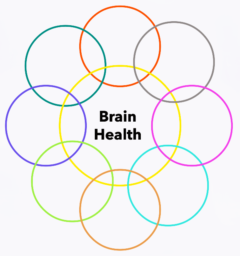Sleep plays a crucial role in maintaining brain health and preventing cognitive decline through several key mechanisms. By understanding how sleep affects the brain, we can start prioritizing rest much more. Promoting healthy sleep requires adopting a variety of practices and lifestyle changes that align with the body’s natural rhythms, and support relaxation and restoration.
Sleep is vital for brain health, supporting memory, waste clearance, neural plasticity, mood regulation, and energy metabolism, helping to prevent cognitive decline and neurodegenerative diseases. Recognizing these key roles of sleep can be a real game-changer in how we view our nighttime habits. By focusing on getting better sleep, we’re actively protecting our brains from potential harm, paving the way for improved mental health and cognitive function.
Mechanisms Behind Improved Brain Health through Sleep
When we dive deeper into how sleep benefits the brain, several key mechanisms come into play. These processes are critical to ensure our brains function optimally over time, preventing cognitive decline and supporting overall mental health.
Quality sleep is known to reduce inflammation and oxidative stress, both of which can lead to cellular damage in the brain. During sleep, the body repairs itself, helping to lower these damaging processes. This protective effect ensures that our brain tissues remain as healthy as possible, reducing the risk of long-term damage.
One fascinating mechanism is the activation of the glymphatic system, primarily active during restful sleep. This system clears out brain waste, including potentially harmful proteins and toxins linked to neurodegenerative diseases. It’s like giving the brain a deep clean, reducing risks that might come with poor clearance. Without enough sleep, these waste products might stick around a little too long, potentially affecting brain health.
Then there’s synaptic pruning and neural plasticity. When we sleep, the brain is busy trimming unnecessary connections, making room for more valuable ones like spring cleaning for our neural networks. This pruning helps improve cognitive abilities and adaptability, directly linked to learning and memory formation.
Sleep also bolsters neurogenesis, the creation of new neurons in the brain. Adequate rest supports this process, keeping the brain’s ability to adapt and grow stronger. This is crucial for learning new skills and maintaining flexible thinking as we age.
Sleep is also critical for memory consolidation. Ever notice how pulling an all-nighter doesn’t really help retain information? There’s a reason for that. Our brains need that downtime to process and store memories. It’s like when a computer runs a backup at night, organizing everything into its proper places. Without adequate sleep, this whole process gets disrupted, making it tougher to remember and learn new things.
Mood regulation is another area where sleep shines. Ever notice how everything seems tougher after a rough night? The brain uses that rest period to process emotions and restore balance. Without it, we might find ourselves more irritable, anxious, or even feeling down.
Another significant mechanism involves the regulation of brain energy metabolism. Sleep allows the brain to reset its energy levels, balancing the nutrients needed for optimal function. This energy management is crucial in maintaining brain health day in and day out, influencing how well we think and perform mentally.
By understanding these mechanisms, we can appreciate the complexity of sleep’s impact on brain health, making informed choices to prioritize and protect our sleep – for the sake of our brains.
Practical Strategies for Enhancing Sleep Quality
There are simple yet effective strategies to enhance the quality of sleep, directly influencing brain health benefits. It starts with focusing on a consistent sleep schedule. Going to bed and waking up at the same time every day sets a natural rhythm for the body, helping regulate the internal clock and promoting better overall sleep quality.
Creating a relaxing bedtime routine helps signal to the brain that it’s time to wind down. This could include activities like reading, taking a warm bath, or practicing meditation. By doing so, the body gets into a habit of transitioning into sleep mode, making it easier to fall asleep naturally.
Optimizing the sleep environment plays a crucial role too. Ensuring the bedroom is cool, quiet, and dark can significantly impact the ability to fall and stay asleep. Investing in comfortable bedding and eliminating noise disruptions could make a noticeable difference.
Limiting blue light exposure in the evening should also be considered. Screens from phones, tablets, and TVs emit blue light, which can confuse the brain into thinking it’s still daytime. Reducing screen time or using blue light filters can help signal the brain that it’s nearing bedtime.
Stress and anxiety management is another key area. Finding ways to unwind and release stress before bed can aid in improving sleep quality. Techniques like deep breathing exercises, gentle yoga, or journaling can effectively reduce stress, helping you settle into a more restful sleep.
Integrating Lifestyle Practices to Promote Better Sleep
The influence of lifestyle choices on sleep quality is often underestimated, yet these choices play a crucial role in optimizing rest. One key area to consider is diet. Paying attention to what and when you eat can either help or hinder sleep. It’s beneficial to avoid heavy meals close to bedtime and be mindful of caffeine and alcohol intake, as these can disrupt sleep patterns.
Regular physical activity is another essential factor. Engaging in exercise helps regulate the sleep-wake cycle, releasing pent-up energy and stress that might otherwise make it tough to unwind before bed. Just remember to avoid vigorous workouts too close to bedtime, as they might rev you up instead of winding you down.
Exposure to natural light during the day is vital for regulating our circadian rhythms. Spending time outdoors or in bright environments during the day can promote alertness and make falling asleep easier when night comes. It’s like setting your internal clock to the right time zone.
Napping isn’t off the table, but timing matters. Avoiding naps late in the day can prevent them from interfering with nighttime sleep. If naps are necessary, earlier in the day for shorter durations, no more than 20 to 30 minutes, is better.
Being proactive about assessing any underlying sleep disorders is also wise. Conditions like sleep apnea or insomnia can significantly impact rest quality. Addressing these with the help of healthcare professionals might be the key to unlocking better sleep and a healthier brain overall.
By adopting these lifestyle practices, not only can we improve our sleep quality but also foster the brain’s long-term health, ultimately supporting better cognitive function and emotional well-being.





